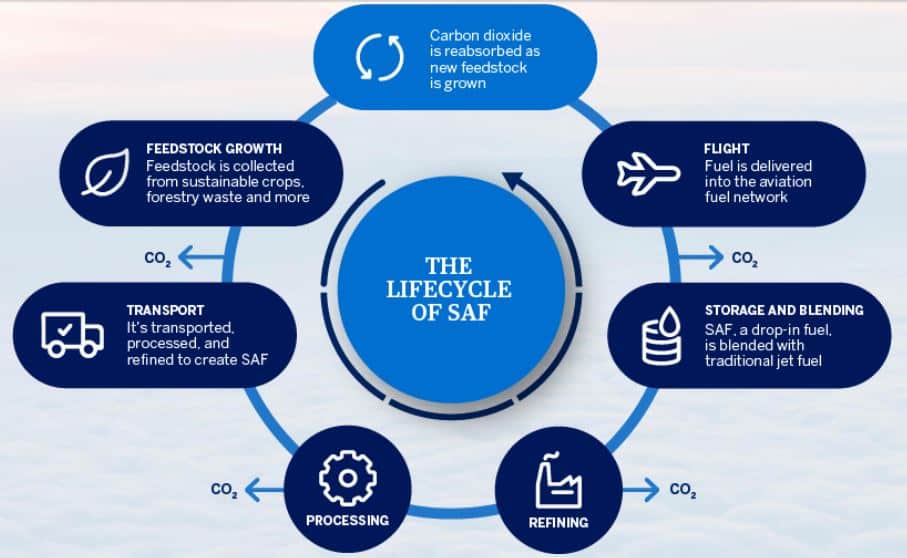Google has joined a Shell-backed sustainable aviation fuel (SAF) program intended to scale up SAF as part of its stride to be carbon neutral throughout entire operations by 2030.
The SAF program called Avelia was launched last year by Shell and American Express Global Business Travel (Amex GBT). It allows airlines to sell SAF and corresponding carbon credits to business customers.
The world’s most popular search engine is the latest multinational corporation to sign up for the SAF and carbon credit program.
Reducing Aviation’s Carbon Emissions with SAF
Aviation is one of the sectors that finds it challenging to reduce its carbon footprint and reach net zero emissions. And business travel is a critical customer segment for airlines as it generates 40% of their revenues. It also represents about 15% of global air travel, as per Amex GBT president Andrew Crawley.
Crawley further noted that having Google onboard their SAF program shows how corporate collaboration can help make travel more sustainable. It can also help ramp up the aviation industry’s transition to net zero.
Why Avelia?
Shell and Amex GBT launched the Avelia program with the goal to provide companies with access to SAF and use it to reduce their business travel emissions. The paid premium price will also ramp up the demand for emerging low-carbon biofuels like SAF.
Avelia is the first blockchain-powered SAF “book and claim” tool built together by Shell Aviation, Accenture, and Energy Web Foundation. The initiative aims to offer 1 million gallons of SAF credits to buyers, equivalent to powering about 15,000 corporate travels from London to New York.
As Shell Aviation puts it,
“Avelia aims to jumpstart the SAF market by enabling business travelers and airlines to share the benefits of SAF while each receiving respective credit for the associated carbon emission reductions.”
SAF is made from renewable and sustainable resources that can be combined with fossil-based jet fuel to slash emissions. As a ‘drop-in’ fuel, airlines can use SAF without the need for modification and it’s currently in use.
Experts consider SAF as one of the most promising solutions to accelerate the sector’s transition to a low-carbon future.

Joining the Avelia program enables Google to receive the credits for the amount of carbon emissions their purchased SAF reduces. Each credit represents a tonne of reduced carbon emissions.
Google’s Flight Toward A Green Future
For years, Google has been investing in low-carbon initiatives that can help reduce global carbon emissions. From its eco-friendly routing to the green cloud, the tech giant commits to reaching carbon neutrality across its entire value chain.
This recent move brings Google’s commitment to aviation. It’s joining other major companies that commit to decarbonize the sector such as insurance firm Aon and Bank of America. Major airlines are also onboard the program, including JetBlue, Delta, Japan Airlines, and Cathay Pacific, among many others.
The tech major believes that SAF plays an important role in driving down aviation’s carbon emissions. Google’s climate and energy director said that signing up in Shell and Amex GBT’s SAF program “represents Google’s continued efforts to accelerate the global transition to a carbon-free future”.
Just like how the tech company leverages its eco-friendly Map feature, Google is also partnering with key industry players to help pilots pick flight paths with the lowest emissions.
This is in line with its latest research initiative with American Airlines and Breakthrough Energy. They aim to harness the power of AI data mapping to tackle the impact of aircraft contrails on the climate. This can further help reduce airlines’ carbon footprint, alongside the use of SAF.
Why Promote SAF?
Compared to conventional jet fuel, SAF can cut a plane’s flight emissions by up to 80%. That’s because it can be made from renewable sources like crops, animal fats, waste oils, municipal waste, and captured carbon.
However, sustainable fuel comprises less than 0.1% of global aviation fuel available right now. Plus, it costs more than conventional jet fuels, about 2x to 8x higher.
Thus, some are doubtful if there would be enough input to satisfy the growing demand for SAF and if its cost can be cut down to make it affordable for the airlines to use.
Despite these concerns, Amex GBT believes that SAF is critical in decarbonizing aviation, accounting for 90% of business travel emissions. This figure highlights the crucial need for corporations to address their air travel carbon footprint.
Amex GBT has over 19,000 corporate clients globally and Shell Aviation has major airlines as customers. Combining their client base in forming Avelia, together they think that the program can help reduce costs and increase demand to scale SAF. Google’s signup helps them send a significant investment signal to the market.
There are also important milestones happening in the sector that contribute to ramping up SAF and top-up demand.
In April, JPMorgan Chase, Bank of America, Meta, Boston Consulting Group, and other major firms agreed to buy SAF credits. They join together as members of the Sustainable Aviation Buyers Alliance (SABA) aimed to boost demand for biofuel.
Also, earlier this year, United Airlines launched a $100 million investment vehicle for SAF. Last month, a climate tech startup Twelve revolutionized SAF production in the US by breaking ground in its commercial facility that turns captured carbon into biofuel.
By promoting sustainable aviation fuel and carbon reduction, Google, Shell Aviation, Amex GBT, and other companies embody the commitment of corporations to pursue a greener business aviation travel.

